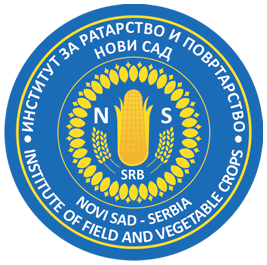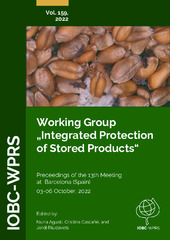Приказ основних података о документу
Are trypsin inhibitors responsible for the suitability of different legumes for Acanthocelides obtectus development?
| dc.creator | Gvozdenac, Sonja | |
| dc.creator | Ilić, Aleksandra | |
| dc.creator | Vasić, Mirjana | |
| dc.creator | Nagl, Nevena | |
| dc.creator | Prvulović, Dejan | |
| dc.creator | Petrović, Gordana | |
| dc.creator | Tanasković, Snežana | |
| dc.creator | Vukajlović, Filip | |
| dc.date.accessioned | 2022-10-19T10:50:46Z | |
| dc.date.available | 2022-10-19T10:50:46Z | |
| dc.date.issued | 2022 | |
| dc.identifier.isbn | 978-92-9067-345-3 | |
| dc.identifier.uri | http://fiver.ifvcns.rs/handle/123456789/3143 | |
| dc.description.abstract | Legumes represent a valuable source of proteins in human and animal nutrition, as well as of different nutrients. Also, they enable diversification of agroecosystems and can be considered climate smart crops. Therefore, they are gaining importance in both developed and developing countries. The most important, and often limiting factor in legume production is the presence of the bean weevil (Acanthoscelides obtectus). This work tested the suitability of three different legume species, i. e. common bean, grass pea and faba bean (two accessions of each species) with growing interest in human nutrition, for the development and population growth of this pest, with special emphasis on the levels of anti-nutritive compounds – trypsin inhibitors. The suitability was assessed based on the progeny production after each month. The development and progeny production were significantly affected by the legume species, but also by the accessions. The highest number of emerged adults was on common bean, while the lowest regardless on observation period, was on faba bean, indicating its low suitability for weevil development. Correlation analysis detected significant influence of the level of trypsin inhibitors on progeny production. | sr |
| dc.language.iso | en | sr |
| dc.publisher | International Organization for Biological and Integrated Control of Noxious Animals and Plants, West Palearctic Regional Section (IOBC-WPRS) | sr |
| dc.relation | info:eu-repo/grantAgreement/MESTD/inst-2020/200032/RS// | sr |
| dc.rights | openAccess | sr |
| dc.rights.uri | https://creativecommons.org/licenses/by/4.0/ | |
| dc.source | Preceedings, 13th Meeting of the Working Group "Integrated Protection of Stored Products", 3-6 October 2022, Barcelona, Spain | sr |
| dc.subject | bean weevil | sr |
| dc.subject | common bean | sr |
| dc.subject | faba bean | sr |
| dc.subject | grass pea | sr |
| dc.subject | progeny production | sr |
| dc.subject | antinutritive compounds | sr |
| dc.title | Are trypsin inhibitors responsible for the suitability of different legumes for Acanthocelides obtectus development? | sr |
| dc.type | conferenceObject | sr |
| dc.rights.license | BY | sr |
| dc.citation.epage | 70 | |
| dc.citation.spage | 64 | |
| dc.citation.volume | 159 | |
| dc.description.other | This work was done as a part of activities of the Centre of Excellence for Innovations in Breeding of Climate Resilient Crops – Climate Crops, Institute of Field and Vegetable Crops, Serbia. | sr |
| dc.identifier.fulltext | http://fiver.ifvcns.rs/bitstream/id/8816/bitstream_8816.pdf | |
| dc.identifier.rcub | https://hdl.handle.net/21.15107/rcub_fiver_3143 | |
| dc.type.version | publishedVersion | sr |


